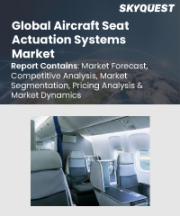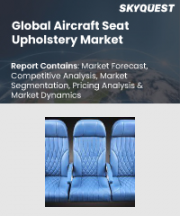
|
시장보고서
상품코드
1554240
항공기 시트 시장 규모, 점유율, 동향 분석 보고서 : 구성요소별, 클래스별, 항공기별, 규격별, 최종 용도별, 지역별, 부문별 예측(2024-2030년)Aircraft Seating Market Size, Share & Trends Analysis Report By Component, By Class, By Aircraft, By Standard (16G, 21G), By End Use, By Region, And Segment Forecasts, 2024 - 2030 |
||||||
항공기 시트 시장 규모 및 동향:
세계 항공기 시트 시장 규모는 2023년 74억 2,000만 달러로 추산되며, 2024년부터 2030년까지 연평균 6.5% 성장할 것으로 예상됩니다.
세계화, 가처분 소득 증가, 저가 항공사의 확대 등의 요인으로 항공 승객 수는 꾸준히 증가하고 있습니다. 항공기를 이용하는 사람들이 늘어남에 따라 항공사는 항공기를 확장하고 운항 횟수를 늘리고 있으며, 이는 항공기 시트에 대한 수요 증가로 이어지고 있습니다. 또한, 특히 아시아태평양, 중동 및 아프리카 등 신흥 시장에서 항공 여행이 증가함에 따라 항공사는 새로운 항공기를 구입하거나 기존 항공기를 개조하여 시장 성장에 큰 기여를 하고 있습니다.
항공사는 증가하는 수요에 대응하고 노후화된 항공기를 교체하기 위해 새로운 항공기에 많은 투자를 하고 있습니다. Boeing과 Airbus와 같은 주요 항공기 제조업체는 많은 수주 잔고를 보유하고 있으며, 이러한 새로운 항공기의 대부분은 고급 좌석 솔루션이 필요합니다. 따라서 시장 성장 전망은 매우 밝습니다. 또한, 이들 기업은 승객의 편안함을 높이고 현대적 기준에 부합하도록 기존 항공기의 인테리어를 업그레이드하는 데에도 주력하고 있습니다. 여기에는 인체공학적, 경량화, 향상된 기내 엔터테인먼트 시스템을 갖춘 새로운 모델로 노후화된 좌석과 비효율적인 시트를 교체하는 것도 포함됩니다.
시장 성장은 탄소섬유 및 복합재료와 같은 첨단 소재를 시트 구조에 사용하는 것이 주요 기술 트렌드로 자리 잡으면서 더욱 가속화되고 있습니다. 이러한 소재는 항공기의 전체 무게를 줄여 항공사의 연료 소비와 운항 비용을 절감하는 데 도움이 됩니다. 따라서 경량화 시트 솔루션에 대한 수요가 증가하고 있습니다. 또한, 최근 항공기 시트은 승객의 편안함과 경험을 향상시킬 수 있는 기능을 갖춘 설계가 증가하고 있습니다. 특히 프리미엄 클래스에서 이러한 경향은 더욱 두드러지는데, 조절 가능한 머리 받침대, 요추 지지대, 넓은 다리 공간 등이 이에 해당합니다. 좌석 내 전원 콘센트, USB 포트, 고해상도 기내 엔터테인먼트 시스템 통합도 표준화되어 기술적으로 진보된 항공기 시트에 대한 수요를 주도하고 있습니다.
항공 업계는 지속가능한 항공기 설계를 도입하는 데 점점 더 중점을 두고 있으며, 연료 소비와 배기가스 배출을 줄이는 데 기여하는 가볍고 환경 친화적인 좌석 솔루션에 대한 수요가 증가하고 있습니다. 항공사들이 환경 친화적인 좌석 제작을 위해 재활용이 가능하고 생분해성 및 저배출 재료를 사용하는 것이 일반화되고 있습니다. 이러한 추세는 재료 과학과 시트 디자인의 혁신을 촉진하고 시장 성장의 새로운 기회를 창출하고 있습니다.
목차
제1장 조사 방법과 범위
제2장 주요 요약
제3장 항공기 시트 시장 - 업계 전망
- 시장 계통 전망
- 업계 밸류체인 분석
- 시장 역학
- 업계 분석 툴
제4장 항공기 시트 시장 : 구성요소 추정·동향 분석
- 구성요소 변동 분석과 시장 점유율, 2023년·2030년
- 구성요소별
제5장 항공기 시트 시장 : 클래스 추정·동향 분석
- 클래스 변동 분석과 시장 점유율, 2023년·2030년
- 클래스별
제6장 항공기 시트 시장 : 항공기 추정·동향 분석
- 항공기 변동 분석과 시장 점유율, 2023년·2030년
- 항공기별
제7장 항공기 시트 시장 : 규격 추정·동향 분석
- 규격 변동 분석과 시장 점유율, 2023년·2030년
- 규격별
제8장 항공기 시트 시장 : 최종 용도 추정·동향 분석
- 최종 용도 변동 분석과 시장 점유율, 2023년·2030년
- 최종 용도별
제9장 지역 추정·동향 분석
- 항공기 시트 시장, 지역별, 2023년·2030년
- 북미
- 북미의 항공기 시트 시장 추정과 예측, 2018-2030년
- 미국
- 캐나다
- 멕시코
- 유럽
- 유럽의 항공기 시트 시장 추정과 예측, 2018-2030년
- 독일
- 영국
- 프랑스
- 아시아태평양
- 아시아태평양의 항공기 시트 시장 추정과 예측, 2018-2030년
- 일본
- 중국
- 인도
- 한국
- 호주
- 라틴아메리카
- 라틴아메리카의 항공기 시트 시장 추정과 예측, 2018-2030년
- 브라질
- 중동 및 아프리카(MEA)
- 중동 및 아프리카의 항공기 시트 시장 추정과 예측, 2018-2030년
- 아랍에미리트
- 사우디아라비아
- 남아프리카공화국
제10장 항공기 시트 시장 - 경쟁 상황
- 최근의 동향과 영향 분석 : 주요 시장 진출 기업별
- 기업 분류
- 진출 기업 개요
- 재무 실적
- 제품 벤치마크
- 기업 시장 점유율 분석, 2023년
- 기업 히트맵 분석
- 전략 매핑
- 확대
- 인수합병
- 협업/파트너십
- 신제품 발매
- 기업 개요
- Safran Group
- RECARO Aircraft Seating GmbH & Co. KG
- Jamco Corporation
- Thompson Aero Seating
- Hong Kong Aircraft Engineering Company Limited
- Airbus Atlantic SAS
- RTX Corporation
- Expliseat S.A.S.
- ZIM Aircraft Seating GmbH
- Geven SPA
- Adient Aerospace LLC
- Aslesan A.S.
- Aviointeriors s.p.a.
- Mirus Aircraft Seating Ltd
- Iacobucci HF Aerospace S.p.A.
Aircraft Seating Market Size & Trends:
The global aircraft seating market size was estimated at USD 7.42 billion in 2023 and is projected to grow at a CAGR of 6.5% from 2024 to 2030. The number of air passengers has been steadily increasing due to factors such as globalization, rising disposable incomes, and the expansion of low-cost carriers. As more people travel by air, airlines are expanding their fleets and increasing the frequency of flights, leading to higher demand for aircraft seating. Moreover, the rise in air travel, particularly in emerging markets such as Asia-Pacific, the Middle East, and Africa, is prompting airlines to acquire new aircraft and retrofit existing ones, which is significantly contributing to the market growth.
Airlines are investing heavily in new aircraft to meet growing demand and replace aging fleets. Major aircraft manufacturers such as Boeing and Airbus have substantial order backlogs, with many of these new aircraft requiring advanced seating solutions. This is creating positive growth prospects for the market. These companies are also focusing on upgrading the interiors of their existing fleets to enhance passenger comfort and align with modern standards. This includes the replacement of older, less efficient seats with newer models that offer better ergonomics, reduced weight, and enhanced in-flight entertainment systems.
The market growth is being further driven by the use of advanced materials such as carbon fiber and composite materials in seat construction is a major technological trend. These materials help reduce the overall weight of the aircraft, leading to lower fuel consumption and operating costs for airlines. The demand for lightweight seating solutions is therefore increasing. Furthermore, modern aircraft seats are increasingly designed with features that improve passenger comfort and experience. These include adjustable headrests, lumbar support, and more legroom, especially in premium cabins. The integration of in-seat power outlets, USB ports, and high-definition in-flight entertainment systems are also becoming standard, driving demand for technologically advanced aircraft seating.
The aviation industry is increasingly focusing on incorporating sustainable aircraft design, lightweight and environmentally friendly seating solutions that contribute to lower fuel consumption and emissions are witnessing heightened demand. The use of recyclable, biodegradable, and low-emission materials in seat manufacturing is becoming more common as airlines seek to improve their environmental credentials. This trend is driving innovation in materials science and seat design, creating new opportunities for market growth.
Global Aircraft Seating Market Report Segmentation
This report forecasts and estimates revenue growth at the global, regional, and country levels along with analyzes the latest market trends and opportunities in each one of the sub-segments from 2018 to 2030. For this study, Grand View Research has further segmented the global aircraft seating market report based on component, class, aircraft, standard, end use, and region:
- Component Outlook (Revenue, USD Million, 2018 - 2030)
- Structure
- Foams
- Actuators
- Electrical Fittings
- Others
- Class Outlook (Revenue, USD Million, 2018 - 2030)
- Business Class
- Economy Class
- Premium Economy Class
- First Class
- Pilot & Crew Seating
- Aircraft Outlook (Revenue, USD Million, 2018 - 2030)
- Narrow Body Aircraft
- Wide Body Aircraft
- Business Jets
- Regional Transport Aircraft
- Standard Outlook (Revenue, USD Million, 2018 - 2030)
- 9G
- 16G
- 21G
- End Use Outlook (Revenue, USD Million, 2018 - 2030)
- OEM
- Aftermarket
- Regional Outlook (Revenue, USD Million, 2018 - 2030)
- North America
- U.S.
- Canada
- Mexico
- Europe
- Germany
- UK
- France
- Asia Pacific
- Japan
- China
- India
- South Korea
- Australia
- Latin America
- Brazil
- Middle East and Africa (MEA)
- UAE
- Saudi Arabia
- South Africa
Table of Contents
Chapter 1. Methodology and Scope
- 1.1. Market Segmentation & Scope
- 1.2. Market Definitions
- 1.3. Information Procurement
- 1.3.1. Information analysis
- 1.3.2. Market formulation & data visualization
- 1.3.3. Data validation & publishing
- 1.4. 4 Research Scope and Assumptions
- 1.4.1. List of Data Sources
Chapter 2. Executive Summary
- 2.1. Aircraft Seating Market Snapshot
- 2.2. Aircraft Seating Market- Segment Snapshot (1/3)
- 2.3. Aircraft Seating Market- Segment Snapshot (2/3)
- 2.4. Aircraft Seating Market- Segment Snapshot (3/3)
- 2.5. Aircraft Seating Market- Competitive Landscape Snapshot
Chapter 3. Aircraft Seating Market - Industry Outlook
- 3.1. Market Lineage Outlook
- 3.2. Industry Value Chain Analysis
- 3.3. Market Dynamics
- 3.3.1. Market Driver Analysis
- 3.3.2. Market Restraint Analysis
- 3.3.3. Market Opportunity
- 3.3.4. Market Challenges
- 3.4. Industry Analysis Tools
- 3.4.1. Porter's analysis
- 3.4.2. Macroeconomic analysis
Chapter 4. Aircraft Seating Market: Component Estimates & Trend Analysis
- 4.1. Component Movement Analysis & Market Share, 2023 & 2030
- 4.2. Aircraft Seating Market Estimates & Forecast, By Component (USD Million)
- 4.2.1. Structure
- 4.2.2. Foams
- 4.2.3. Actuators
- 4.2.4. Electrical Fittings
- 4.2.5. Others
Chapter 5. Aircraft Seating Market: Class Estimates & Trend Analysis
- 5.1. Class Movement Analysis & Market Share, 2023 & 2030
- 5.2. Aircraft Seating Market Estimates & Forecast, By Class (USD Million)
- 5.2.1. Business Class
- 5.2.2. Economy Class
- 5.2.3. Premium Economy Class
- 5.2.4. First Class
- 5.2.5. Pilot & Crew Seating
Chapter 6. Aircraft Seating Market: Aircraft Estimates & Trend Analysis
- 6.1. Aircraft Movement Analysis & Market Share, 2023 & 2030
- 6.2. Aircraft Seating Market Estimates & Forecast, By Aircraft (USD Million)
- 6.2.1. Narrow Body Aircraft
- 6.2.2. Wide Body Aircraft
- 6.2.3. Business Jets
- 6.2.4. Regional Transport Aircraft
Chapter 7. Aircraft Seating Market: Standard Estimates & Trend Analysis
- 7.1. Standard Movement Analysis & Market Share, 2023 & 2030
- 7.2. Aircraft Seating Market Estimates & Forecast, By Standard (USD Million)
- 7.2.1. 9G
- 7.2.2. 16G
- 7.2.3. 21G
Chapter 8. Aircraft Seating Market: End Use Estimates & Trend Analysis
- 8.1. End Use Movement Analysis & Market Share, 2023 & 2030
- 8.2. Aircraft Seating Market Estimates & Forecast, By End Use (USD Million)
- 8.2.1. OEM
- 8.2.2. Aftermarket
Chapter 9. Regional Estimates & Trend Analysis
- 9.1. Aircraft Seating Market by Region, 2023 & 2030
- 9.2. North America
- 9.2.1. North America Aircraft Seating Market Estimates & Forecasts, 2018 - 2030 (USD Million)
- 9.2.2. U.S.
- 9.2.3. Canada
- 9.2.4. Mexico
- 9.3. Europe
- 9.3.1. Europe Aircraft Seating Market Estimates & Forecasts, 2018 - 2030 (USD Million)
- 9.3.2. Germany
- 9.3.3. UK
- 9.3.4. France
- 9.4. Asia Pacific
- 9.4.1. Asia Pacific Aircraft Seating Market Estimates & Forecasts, 2018 - 2030 (USD Million)
- 9.4.2. Japan
- 9.4.3. China
- 9.4.4. India
- 9.4.5. South Korea
- 9.4.6. Australia
- 9.5. Latin America
- 9.5.1. Latin America Aircraft Seating Market Estimates & Forecasts, 2018 - 2030 (USD Million)
- 9.5.2. Brazil
- 9.6. Middle East & Africa (MEA)
- 9.6.1. MEA Aircraft Seating Market Estimates & Forecasts, 2018 - 2030 (USD Million)
- 9.6.2. UAE
- 9.6.3. Saudi Arabia
- 9.6.4. South Africa
Chapter 10. Aircraft Seating Market - Competitive Landscape
- 10.1. Recent Developments & Impact Analysis, By Key Market Participants
- 10.2. Company Categorization
- 10.3. Participant's Overview
- 10.4. Financial Performance
- 10.5. Product Benchmarking
- 10.6. Company Market Share Analysis, 2023
- 10.7. Company Heat Map Analysis
- 10.8. Strategy Mapping
- 10.8.1. Expansion
- 10.8.2. Merger & Acquisition
- 10.8.3. Collaborations/Partnerships
- 10.8.4. New Product Launches
- 10.9. Company Profiles
- 10.9.1. Safran Group
- 10.9.1.1. Participant's Overview
- 10.9.1.2. Financial Performance
- 10.9.1.3. Product Benchmarking
- 10.9.1.4. Recent Developments
- 10.9.2. RECARO Aircraft Seating GmbH & Co. KG
- 10.9.2.1. Participant's Overview
- 10.9.2.2. Financial Performance
- 10.9.2.3. Product Benchmarking
- 10.9.2.4. Recent Developments
- 10.9.3. Jamco Corporation
- 10.9.3.1. Participant's Overview
- 10.9.3.2. Financial Performance
- 10.9.3.3. Product Benchmarking
- 10.9.3.4. Recent Developments
- 10.9.4. Thompson Aero Seating
- 10.9.4.1. Participant's Overview
- 10.9.4.2. Financial Performance
- 10.9.4.3. Product Benchmarking
- 10.9.4.4. Recent Developments
- 10.9.5. Hong Kong Aircraft Engineering Company Limited
- 10.9.5.1. Participant's Overview
- 10.9.5.2. Financial Performance
- 10.9.5.3. Product Benchmarking
- 10.9.5.4. Recent Developments
- 10.9.6. Airbus Atlantic SAS
- 10.9.6.1. Participant's Overview
- 10.9.6.2. Financial Performance
- 10.9.6.3. Product Benchmarking
- 10.9.6.4. Recent Developments
- 10.9.7. RTX Corporation
- 10.9.7.1. Participant's Overview
- 10.9.7.2. Financial Performance
- 10.9.7.3. Product Benchmarking
- 10.9.7.4. Recent Developments
- 10.9.8. Expliseat S.A.S.
- 10.9.8.1. Participant's Overview
- 10.9.8.2. Financial Performance
- 10.9.8.3. Product Benchmarking
- 10.9.8.4. Recent Developments
- 10.9.9. ZIM Aircraft Seating GmbH
- 10.9.9.1. Participant's Overview
- 10.9.9.2. Financial Performance
- 10.9.9.3. Product Benchmarking
- 10.9.9.4. Recent Developments
- 10.9.10. Geven SPA
- 10.9.10.1. Participant's Overview
- 10.9.10.2. Financial Performance
- 10.9.10.3. Product Benchmarking
- 10.9.10.4. Recent Developments
- 10.9.11. Adient Aerospace LLC
- 10.9.11.1. Participant's Overview
- 10.9.11.2. Financial Performance
- 10.9.11.3. Product Benchmarking
- 10.9.11.4. Recent Developments
- 10.9.12. Aslesan A.S.
- 10.9.12.1. Participant's Overview
- 10.9.12.2. Financial Performance
- 10.9.12.3. Product Benchmarking
- 10.9.12.4. Recent Developments
- 10.9.13. Aviointeriors s.p.a.
- 10.9.13.1. Participant's Overview
- 10.9.13.2. Financial Performance
- 10.9.13.3. Product Benchmarking
- 10.9.13.4. Recent Developments
- 10.9.14. Mirus Aircraft Seating Ltd
- 10.9.14.1. Participant's Overview
- 10.9.14.2. Financial Performance
- 10.9.14.3. Product Benchmarking
- 10.9.14.4. Recent Developments
- 10.9.15. Iacobucci HF Aerospace S.p.A.
- 10.9.15.1. Participant's Overview
- 10.9.15.2. Financial Performance
- 10.9.15.3. Product Benchmarking
- 10.9.15.4. Recent Developments
- 10.9.1. Safran Group
(주말 및 공휴일 제외)


















